|
|
|
Sort Order |
|
|
|
Items / Page
|
|
|
|
|
|
|
| Srl | Item |
| 1 |
ID:
155137


|
|
|
|
|
| Summary/Abstract |
Treating the threat of climate change in the Caribbean as a case study instructive for responses globally, this article examines the social and political relations of climate change. It argues for an analysis taking into account the ways in which the histories of imperialism and colonialism have shaped contemporary global ‘development’ pathways. The article charts how Caribbean vulnerability to temperature rises of more than 1.5°C of warming comprise an existential threat structured by contemporary social relations that are imperialist in character. Hope can be taken from a politics of climate justice which acknowledges the climate debts owed to the region.
|
|
|
|
|
|
|
|
|
|
|
|
|
|
|
|
| 2 |
ID:
180209
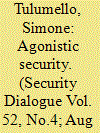

|
|
|
|
|
| Summary/Abstract |
This article aims to contribute toward transcending the dichotomy between deconstruction and reconstruction in critical security studies. In the first part, I review dominant (Western/liberal) logics of security and the main strands of critical security studies to argue that there is a need to overcome the liberal framework of the balance between rights and freedom, with its inherent imbrication with the fantasy of absolute security; and, contra the ultimate conclusions of deconstructive critique, at the same time to take the desire for security seriously. By advocating in favor of embracing the tensions that surface at the intersection of these two conclusions, I then move to my reconstructive endeavor. I set out a meta-theory – that of agonistic security – that is both analytical and normative in nature and inspired by the political theory developed by Mouffe and Laclau. Building on the opposition between antagonism and agonism, I argue that security belongs to the ‘political’ and that it constitutes a field of struggle for politicization. I then argue for three conceptual shifts that concretely define agonistic security: (i) from an absolute/static to a relational/dynamic understanding of security; (ii) from universalism to pluralism at a world scale; and (iii) from the dominance of individual rights in Western/liberal thinking toward an understanding of security as a collective endeavor. In conclusion, I take a step back and discuss the implications of agonistic security for the role of critique in security studies.
|
|
|
|
|
|
|
|
|
|
|
|
|
|
|
|
| 3 |
ID:
145393
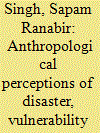

|
|
|
|
|
| Summary/Abstract |
A structured analysis of social inequalities related to hazards allows for a clarification and redefinition of the involved citizenship rights and their implications for the trust of citizens in public institutions. The concerned individuals, social groups and communities must participate in the knowledge production process about the territory and in the mapping of social vulnerability.
|
|
|
|
|
|
|
|
|
|
|
|
|
|
|
|
| 4 |
ID:
136711
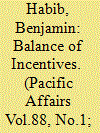

|
|
|
|
|
| Summary/Abstract |
This study is concerned with motivations driving North Korea’s interaction with the United Nations Framework Convention on Climate Change, drawing on information from treaty reporting documents, along with project reports compiled by international agencies and official statements released by the North Korean government. The article draws on causal inference to explore the hypothesis that the leadership perpetuation and state survival imperatives of the North Korean government represent the most likely explanation for North Korea’s interaction with the international climate change regime. It finds a strong probability that North Korea is utilising the UNFCCC as a capacity-building vehicle across its agricultural and energy sectors, a weak issue_images_88_1_Hydroelectric dam at Sinpyong (July 2012)_Habibpossibility that North Korea’s climate change vulnerability is a compelling incentive for greenhouse gas mitigation, and the weak possibility that North Korea is using the Clean Development Mechanism under the UNFCCC as a means for generating foreign currency revenue. The paper argues that the balance of incentives underpinning these motivations can be linked to the leadership perpetuation and state survival imperatives of the North Korean government.
|
|
|
|
|
|
|
|
|
|
|
|
|
|
|
|
| 5 |
ID:
174851


|
|
|
|
|
| Summary/Abstract |
Although adaptation to climate change is becoming increasingly recognised as an unavoidable priority, barriers are consistently encountered and reported. Identifying, analysing and overcoming these barriers is essential for ensuring that, as climate change worsens, adaptation capacities are not exceeded. Despite current studies providing a useful structuring heuristic to guide inquiry, there is a significant gap related to explanations around barrier occurrence and how to overcome them. In response, this article, based on semi‐structured stakeholder interviews, aims to provide preliminary insights into the type of barriers that exist in Laamu Atoll, the Maldives and explore any interdependencies between them. This study found that a range of resource barriers (i.e. funding, physical and human resources in outer islands and data on vulnerable groups) and social barriers (i.e. political/institutional and organisational constraints and inefficiencies, marginalisation and power differences as well as cognitive elements) were hampering adaptation. In exploring the interdependencies that exist between these barriers, the nature of their occurrence, persistence and entry points for resolution were also identified.
|
|
|
|
|
|
|
|
|
|
|
|
|
|
|
|
| 6 |
ID:
088065


|
|
|
|
|
| Publication |
2009.
|
| Summary/Abstract |
Many scholarly analyses of small economies over the past two decades have been premised on the implicit understanding that a state's small population size, compounded by such factors as islandness and remoteness from markets, is to blame for an inherent and unavoidable economic vulnerability. The article critiques the core features of this approach, and proposes in turn to discuss and profile the development trajectories of small economies from the vantage point of the strategic flexibility used by small states (at multiple levels as individuals, household units, corporate entities and complete jurisdictions) in seeking to exploit opportunities and maximize economic gains in a turbulent and dynamic external environment with which they must engage. Keeping alive a portfolio of skills and revenue streams enables these actors to migrate inter-sectorally as well as trans-nationally.
|
|
|
|
|
|
|
|
|
|
|
|
|
|
|
|
| 7 |
ID:
085984
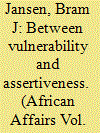

|
|
|
|
|
| Publication |
2008.
|
| Summary/Abstract |
Resettlement to third countries is regarded as a durable solution to refugee crises. In Kakuma refugee camp in north-west Kenya, seeking a better life in industrialized countries has become a preoccupation for many refugees. In this article the effects of the practice of third country resettlement on the camp population are explored. Increased ease of communication with the diaspora, expanded knowledge of entitlements, and the high visibility of resettlement processing within the camp have increased the demand for resettlement. The article argues that the result is an environment that encourages refugees to cheat through claiming insecurity and negotiating vulnerability. Refugees come to believe that resettlement is something that can be actively achieved, rather than a benefit extended only to the genuinely vulnerable
|
|
|
|
|
|
|
|
|
|
|
|
|
|
|
|
| 8 |
ID:
151145


|
|
|
|
|
| Summary/Abstract |
Two million people were affected in the floodplains and low-lying areas in Sirajgang in 2012. Seven hundred and fifty families were made homeless and forced to live in small temporary huts on the river protection embankments. Unemployment rose alarmingly and the jobless left their villages to find work in larger cities, leaving behind their vulnerable and insecure families. Consequently, women were increasingly required to take on totally unfamiliar roles. Our research utilised in-depth interviews with women managing without the support of their husbands. Key findings highlighted that community resilience would improve if these women were engaged at the local operational level of disaster management.
|
|
|
|
|
|
|
|
|
|
|
|
|
|
|
|
| 9 |
ID:
107931
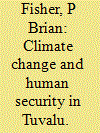

|
|
|
|
|
| Publication |
2011.
|
| Summary/Abstract |
At the local level, global climate change is exacerbating current environmental conditions while creating entirely new environmental and human hazards. The thesis of this article is that these new threats merge with preexisting vulnerabilities, creating a hybridized force that ripples through every aspect of society and threatens human security. The vulnerabilities intensify as these communities lack the adaptive and developmental capacity to address the multifarious effects, further undermining their human security. This article examines the case of the Funafuti, Tuvalu, and the effect of a warming Southern Pacific Ocean on Tuvaluan societal structural flows and processes. As the case demonstrates, climate change becomes more than an environmental issue; rather, it is a global social problem bound by multiple human security issues. For extremely vulnerable countries like Tuvalu, the case suggests that a human security approach best captures the dynamics of climate impacts in vulnerable communities, and, as such, requires adjustments in the global climate regime's current approach. This conclusion also represents a challenge to current scholarship which suggests that the small islands will be uninhabitable simply from sea level rise.
|
|
|
|
|
|
|
|
|
|
|
|
|
|
|
|
| 10 |
ID:
099551


|
|
|
| 11 |
ID:
136254


|
|
|
|
|
| Summary/Abstract |
Energy security studies have expanded from their classic beginnings following the 1970s oil crises to encompass various energy sectors and increasingly diverse issues. This viewpoint contributes to the re-examination of the meaning of energy security that has accompanied this expansion. Our starting point is that energy security is an instance of security in general and thus any concept of it should address three questions: “Security for whom?”, “Security for which values?” and “Security from what threats?” We examine an influential approach – the ‘four As of energy security’ (availability, accessibility, affordability, and acceptability) and related literature of energy security – to show it does not address these questions. We subsequently summarize recent insights which propose a different concept of energy security as ‘low vulnerability of vital energy systems’. This approach opens the road for detailed exploration of vulnerabilities as a combination of exposure to risks and resilience and of the links between vital energy systems and critical social functions. The examination of energy security framed by this concept involves several scientific disciplines and provides a useful platform for scholarly analysis and policy learning.
|
|
|
|
|
|
|
|
|
|
|
|
|
|
|
|
| 12 |
ID:
103858
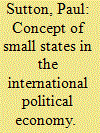

|
|
|
|
|
| Publication |
2011.
|
| Summary/Abstract |
This article examines the literature on small states from the related disciplines of international economics and international politics. By accident and design there is no generally agreed definition and characterisation of small states, although those advanced by the Commonwealth Secretariat and World Bank are most satisfactory. The role of the Commonwealth as a champion of small states is examined. Particular attention is paid to the concept of vulnerability and the challenges and opportunities to small states in a globalised world.
|
|
|
|
|
|
|
|
|
|
|
|
|
|
|
|
| 13 |
ID:
157944
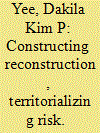

|
|
|
|
|
| Summary/Abstract |
Analysis of post-disaster reconstruction of urban areas has largely been understood as a function of technocratic and institutionalist paradigms, while critical perspectives have been largely influenced by the analysis of “disaster capitalism.” Common to these paradigms is little analysis of state attempts to deploy power over a population through controlling space in urban areas. This paper examines the strategies of internal territorialization undertaken by the Philippines state in post-Haiyan reconstruction polices. Drawing on data from Tacloban City, I show how bourgeois environmentalist and urban ecological security approaches exclude the urban poor from undertaking reconstruction in coastal communities. Discourses of cleanliness and securing the population of the city have accompanied material practices that enforce state territorialization in the city. These processes of state territorialization exclude those residing in risk prone zones from various forms of aid and relief. This paper concludes by highlighting processes of territorialization that have generated conflict in the city, as poor residents engage in forms of counter-territorialization to assert their space in the city.
|
|
|
|
|
|
|
|
|
|
|
|
|
|
|
|
| 14 |
ID:
180692
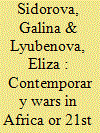

|
|
|
|
|
| Summary/Abstract |
Lately the African continent has been the focus of global attention and discussions on the present and future of Africa, especially with regards to the highly topical questions concerning the global and African state of peace and security. As multiple extremely complex armed conflicts continue to cause chronic instability and vulnerabilities in several African states and regions, they also directly affect the state of international security in the 21st century in an intensively interconnected and globalized world from an economic, political and peace/security perspective. Accordingly, this research article offers an in-depth analysis of some of the major causes and explanations of the existing wars in Africa related to the illicit exploitation of resources, vulnerability, and control. The goal of this work is to reveal and analyze the complexity of 21st-century wars in Africa and their deep interrelated causes by applying the example of the long and banal armed conflicts in the Democratic Republic of the Congo. Thus, the authors argue that the destabilization of the political and socio-economic situation in Africa, and DRC in particular, is directly connected to local and regional conflicts over access to various forms of resources, influence, and power, but also to the artificially created chaos by various interested power parties for expansion, profit, and hope for further profit. In this sense, it has been emphasized that conflicts of so-called ‘low intensity’, artificially maintained over a long period of time, pose no lesser degree of threat to the regional state of peace and security.
|
|
|
|
|
|
|
|
|
|
|
|
|
|
|
|
| 15 |
ID:
188578
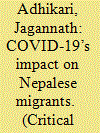

|
|
|
|
|
| Summary/Abstract |
This article examines how COVID-19 has impacted Nepalese migrants’ vulnerability and the actions they have taken to adapt to the situation. It investigates the problems created by COVID-19 from a disaster-risk management approach, the preparatory measures taken to deal with the disaster, and efforts by state and non-state actors in migrants’ rescue, relief, and reintegration into society. Marginal migrants, including unskilled workers, women, undocumented individuals, have been most affected by the pandemic, something which was also overlooked by government policies. The study shows that because government subsidies for migrants were too meagre and came too late, migrants have started going back abroad, despite COVID-19 risks. Furthermore, the study reveals that Nepalese migrants’ vulnerability depends on their levels of education, skills, gender, and legal status. In the light of these findings, the Nepal government needs a stronger institutional structure to help migrants navigate transnational spaces.
|
|
|
|
|
|
|
|
|
|
|
|
|
|
|
|
| 16 |
ID:
117686


|
|
|
|
|
| Publication |
2012.
|
| Summary/Abstract |
This paper reviews the current social protection system in Vietnam with a special focus on access of the poor and vulnerable people. It shows that the system has been expanded to cover more poor and vulnerable people. However, at the same time, delivery of services and financing are still unequal between groups, in which advantaged groups have better utilization of services than disadvantaged groups. To reach a social protection floor, especially a universal health insurance coverage by 2015, the paper argues that the Government of Vietnam will face a number of challenges, in which financing is the most critical. Also, to expand retirements and social assistance effectively, focusing on the poor and vulnerable groups will ensure a sustainable poverty reduction.
|
|
|
|
|
|
|
|
|
|
|
|
|
|
|
|
| 17 |
ID:
142631
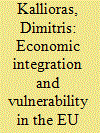

|
|
|
|
|
| Summary/Abstract |
In 2004, the EU launched the European Neighbourhood Policy (ENP), a unified policy framework towards its neighbours in the external EU periphery, aiming at strengthening prosperity, stability and security around its geopolitical borders. However, in-depth empirical analysis provides clear-cut evidence that, while the size and composition of trade flows between the EU and the ENCs may be growing, they are not favourable for the ENCs from the perspective of export diversification, in terms of either products or number of destinations. This condition increases their exposure to volatility in international markets. These results provide valuable insight into economic integration theory and for policymaking.
|
|
|
|
|
|
|
|
|
|
|
|
|
|
|
|
| 18 |
ID:
166340
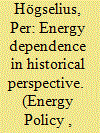

|
|
|
|
|
| Summary/Abstract |
Studies of energy and geopolitics have been almost totally monopolized by analyses of the largest and most powerful countries in the world. This article argues that it is crucial to include the world's smaller and less powerful nations, too, into the analysis. Adopting a systems perspective, the article discusses Europe's smaller nations that have come to depend on other countries for various activities relating to their fuel supplies, and how they have sought to cope with these dependencies over time. It discusses, in particular, two overarching strategies in this context: first, investments in domestic energy sources, and secondly, efforts to cope with – rather than to reduce – energy imports. Smaller nations have often been more dependent and more vulnerable than the larger countries in the geopolitical energy arena. However, there are numerous exceptions to this pattern, especially in terms of the critical hub positions that a range of smaller nations have managed to secure in the international energy trade. Furthermore, Europe's smaller countries have had a more narrow range of methods at their disposal than the larger countries when it comes to coping with energy dependence – but perhaps not as narrow as commonly believed.
|
|
|
|
|
|
|
|
|
|
|
|
|
|
|
|
| 19 |
ID:
193200


|
|
|
|
|
| Summary/Abstract |
This article probes the rural economic development approach in selected informal settlements in Durban and how such approach affects the vulnerability of local Black women to flood impacts within the areas. Qualitative data for the study were gathered through semi-structured interviews and focus group discussions with 25 local Black women from Inanda, Ntuzuma, KwaMashu and Umlazi. Five key informants from the eThekwini (Durban) metropolitan municipality were also interviewed. Findings from the study showed that although there is improved economic development in the selected settlements, which constitute informal settlements designated for Black South Africans during the apartheid era, such an economic development approach has not significantly improved the livelihoods and adaptive capacity of the local women. The article suggests a multidimensional approach to development that is practical, inclusive and equitable, and addresses local women’s challenges associated with climate adaptation and sustainable livelihoods.
|
|
|
|
|
|
|
|
|
|
|
|
|
|
|
|
| 20 |
ID:
173802


|
|
|
|
|
| Summary/Abstract |
The problematics of a rearming Japan continue to be a jigsaw given its pacifist orientation. Japan had brought about the changes in its security policy citing new security challenges posed by burgeoning China and an unpredictable nuclear North Korea, despite the US nuclear umbrella. This paper investigates as to whether Waltzian structural logic can still explain the changes in Japan’s behaviour in the post-11 September 2001 global order. Japan has used the sanction to participate in collective security to modify its military doctrine for a more active role in the use and deployment of Self-Defence Forces and acquisition of offensive weapons. Yet, despite the prevalence of necessary conditions and, as a result, the increased vulnerability to its security, Japan has not breached the nuclear threshold, as Waltzian structural logic had predicted. Japan only managed to augment its military capabilities and ease the constitutional restrictions on use of force to a certain extent.
|
|
|
|
|
|
|
|
|
|
|
|
|
|
|
|
|
|
|
|
|